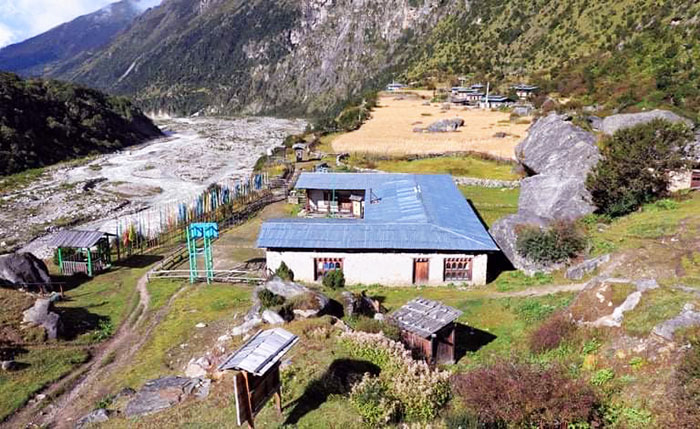Academic session for the lone school ends on November 11
Yangchen C Rinzin
Nine students of Lunana Primary School (PS) will end this academic year without stepping into the classroom or seeing their teachers.
Their school, which opens in April and closes on November 11, had not even started when the government closed all schools with Classes Pre-Primary to VIII in response to the Covid-19 pandemic.
Lunana PS has 40 students from PP-VI with five teachers.
Despite trying to reach all students to teach through Self Instructional Material (SIM), teachers of Lunana PS have not been able to reach a few students who live in the far-flung villages of Lunana.
Teachers distributed SIM to almost all student going from door-to-door. Yet it was becoming difficult to cover everyone and teach through SIM.
It was impossible to visit the nine students who live more than a day’s journey over a mountain from Lunana gewog centre.
“With the present weather condition it’s becoming difficult even to reach those students whom we’ve been following up with,” a teacher said.
Even those they visited earlier were inconsistent in their lessons, as the teachers could not meet them regularly as they were out herding animals or with parents to collecting cordyceps.
So teachers couldn’t follow up on the students’ homework or activities assigned to them. They could not follow up in detail or teach through online Apps like WhatsApp or WeChat.
“We’re now worried about assessing these students, whom we never met, at the end of the year.” Poor internet connectivity in where they live could affect their learning, teachers said.
On the behest of the school, the gewog administration requested Gasa dzongkhag administration to allow students to attend regular lessons in the school. Parents and students were in favour of the proposal.
The dzongkhag administration submitted the request to the education ministry.
A teacher said that they had requested for face-face teaching since there was no positive Covid-19 case reported in the dzongkhag. “There is less risk and we could have managed as we have only a small number of students.”
The students in classes PP-III mostly resided near schools or walkable distance so they were easily reached.
Another teacher said that even if ministry allows them to open the school in the first week of November it would be possible to call students, teach and assess them.
“Although it’s nine students, we’ve not been able to meet almost 40 percent of students to teach properly. It starts snowing by mid-October, which means it’ll be difficult to travel.”
The school also has enough ration – about 86 bags of rice, cooking oil, chickpeas, tea leaves, and sugar.
About 10 bags of rice leftover stock from last year was spoilt and were surrendered.
Further, the gewog does not receive any visitors or there is no other business. “Which is why we feel it’s safe to teach in the school,” a teacher said.
Meanwhile, an education ministry official said that the ministry decided not to consider the request, as similar issues also exist in other highland schools.
“The government decided to keep Classes PP-VIII close, so we’re following the policy. If we consider one case, then other schools will also submit similar requests and we’ll have to bypass the government’s decision.”
The official said teachers could assess them based on whatever was taught so far.
The government earlier had decided that students would be assessed based on online education provided and promote all students to the next class.
In an earlier interview with the health minister, Lyonpo Dechen Wangmo said that from health point they do not see any risk but the ministry would leave it up to education ministry to decide on this case.
However, the school administration has decided that should their request be rejected, teachers would try to visit these students before November to at least teach once and assess.


